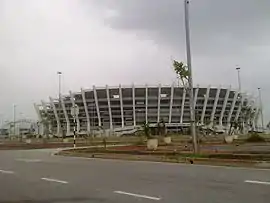Sultan Mizan Zainal Abidin Stadium
Sultan Mizan Zainal Abidin Stadium (Malay: Stadium Sultan Mizan Zainal Abidin) is a multi-purpose stadium in Kuala Nerus District, Terengganu, Malaysia.[1] Together with the adjacent Mini Stadium, it forms the centrepiece of Terengganu Sports Complex. It was used mostly for football matches. The stadium holds 50,000 people and is named after the reigning Terengganu Ruler, Sultan Mizan Zainal Abidin. The biggest stadium in the East Coast region of Peninsular Malaysia, it was built to replace Sultan Ismail Nasiruddin Shah Stadium as the state's main stadium.
 | |

| |
| Location | Gong Badak, Kuala Nerus, Terengganu, Malaysia |
|---|---|
| Coordinates | 5°22′22″N 103°6′23″E |
| Owner | Terengganu State Government |
| Capacity | 50,000 |
| Surface | Cow grass (Formerly)
Bermuda grass (Currently) Artificial grass (Track) |
| Construction | |
| Built | 27 March 2005 |
| Opened | 10 May 2008 |
| Renovated | 2009, 2012, 2014, 2018, 2019, 2020 |
| Construction cost | RM 270 million |
| Architect | Raja Datuk Kamarul Bahrin Shah |
| Tenants | |
| Terengganu FC (2008-2009, 2015-2016, 2020-present) | |
It is the current home ground of Terengganu FC.
History
Sultan Mizan Zainal Abidin Stadium was officially opened by the current Sultan of Terengganu, Sultan Mizan Zainal Abidin whom was also himself by then the 13th Yang di-Pertuan Agong on 10 May 2008. Its first major use was for the main venue of the 12th edition of Sukma Games, the 2008 Sukma Games.[2]
First Collapse of the roof
On 2 June 2009, a major part of the roof construction collapsed under normal weather conditions, including the section above the royal box.[3] It was only about a year after the stadium was officially opened. Witness accounts indicated that a long loud sound similar to a jet engine noise was heard as the roof fell to earth in pieces. A number of staff were in the stadium during the collapse, with preparations for varsity staff games being made. In addition to the games getting cancelled, many pieces of equipment were either damaged or destroyed and vehicles parked nearby being damaged. Fortunately, no casualties were reported.
The major cause for the collapse of the roof was identified to be the design fault and inappropriate materials.[4] There were also reports of sporadic loud bangs and structure damage prior to the collapse. One of the structural repair jobs on the roof was scheduled on the day of the collapse itself, along with some electrical repair works being carried out on other part of the stadium. As of June 2010, the cleaning work and relocation of the collapsed roof were not finished.[5]
On 19 December 2011, Terengganu Menteri Besar Ahmad Said confirmed that the stadium would be repaired by early 2012 with alterations to its roof design, mulling it to be similar with that of the Bukit Jalil National Stadium.[6]
Second Collapse of the roof
On 20 February 2013, the stadium collapsed again while undergoing re-construction work which commenced late 2012. 137 meters (two-thirds of the old structure) collapsed when working construction workers heard loud noises, followed by the collapse of steel pillars. The collapse cause injuries to 5 workers with 3 of them suffering serious injuries.[7]
In October 2014, the stadium undergo a RM26 million repair funded by the Terengganu state government and supervised by the Public Works Department (PWD) involving 14 contractors.[8]
In early January 2018, the stadium roof will undergo re-construction again.[9]
Upgrading the Football Pitch
In April 2019, as part of the Malaysian Football League (MFL) initiative to improve the quality of Malaysian Football, the stadium football pitch were upgraded through MFL pilot project to restore field quality. The stadium pitch is now being carpeted with Bermuda grass and the re-turfing cost RM1 million, sponsored by MFL.[10][11]
On 1 February 2020, the damaged running track cause by the collapse of roof will be replaced with artificial grass and will look exactly like the Tan Sri Dato' Haji Hassan Yunos Stadium. As a result of this, the stadium will be dedicated for football use only.[12]
Events
Politics
The stadium's fate was overseen by Malaysian Opposition as a part of the administration by the former Barisan Nasional government led by then Menteri Besar Idris Jusoh. Idris was removed from Wisma Darul Iman following a fallout with the Terengganu Palace shortly after the 2008 General Elections, an event that formed the background of the 2008 Terengganu Constitutional Crisis.[13] One of his replacement, Ahmad Said's early duties was to attend the officiating of the stadium, a project closely overseen by him.
See also
References
- MACC men begin probe, the star online, 3 June 2009
- "Terengganu opens East Coast's largest stadium". TheStar Online. 11 May 2008. Retrieved 11 May 2008.
- The Real Reason Why Sultan Mizan Zainal Abidin Stadium in Malaysia Collapses, zimbio.com 4 June 2009
- Collapse of Sultan Mizan Zainal Abidin Stadium due to design and materials used, MALAYSIATODAY.com 8 January 2010
- Cleaning Work On Sultan Mizan Stadium To Start Next Week, BERNAMA.COM, 30 June 2010
- Terengganu to replace grandstand roof with new design, The Star Online, 19 December 2011
- "Sultan Mizan Stadium roof collapse for second time, three seriously injured". The Borneo Post Online. 21 February 2013. Retrieved 21 February 2013.
- "Terengganu stadium to undergo RM26 million repair". Astro Awani. 16 October 2014. Retrieved 16 October 2014.
- Harian Metro, 15 January 2018 (Malay)
- "Sultan Mizan Zainal Abidin Stadium to get a field makeover". New Straits Times. 12 April 2019. Retrieved 12 April 2019.
- "Terengganu to have top-class pitch soon". New Straits Times. 12 August 2019. Retrieved 12 August 2019.
- "The SSMZA running track will be replaced by artificial grass, which will look exactly like Larkin Stadium". Foxsports Malaysia. 1 February 2020. Retrieved 1 February 2020.
- Palace-Government Crisis
External links
| Wikimedia Commons has media related to Sultan Mizan Zainal Abidin Stadium. |